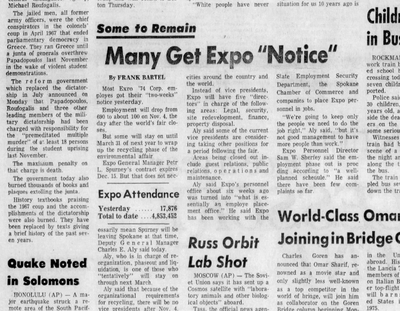This column reflects the opinion of the writer. Learn about the differences between a news story and an opinion column.
50 years ago in Expo history: Hundreds were about to lose their jobs as the end of fair approached

In a clear indication that the end was drawing near, hundreds of Expo ’74 employees received their “two-weeks notice.”
On Nov. 4 – the day after the close – employment at the fair would drop from 690 to about 100.
“Areas being closed out include guest relations, public relations, operations and maintenance,” the Chronicle said.
The fair’s personnel office had already become “what is essentially an employee placement office.”
Some executives and other key personnel would stay on for weeks or months, since there was still plenty of work to be done in dismantling the fair. General manager Petr Spurney’s contract would not expire until Dec. 15. Expo president King Cole’s job would end on Nov. 4, but he would remain in Spokane as a community development consultant.
The jobs of all five vice presidents would expire on the fair’s closing. Some were considering taking other Expo positions during the transition.
In other Expo news, the Coliseum was alive with the sound of bagpipes and drums at a stirring performance of the Welsh Guards Band and the Argyll and Sutherland Highlanders.
From 100 years ago: The local Drama League announced plans to launch a community theater, dubbed the Little Theater of Spokane, with its first production to be held in late November.
“We have dreamed of a little theater and a community drama for Spokane for some years,” the Drama League president said. “Heretofore there has been criticism of the Drama League for the few persons it employed in productions and its supposed closed-door policy.”
He said that now anybody who wishes “may come and be cast in a part at almost any time.”
The first play would be “March Hares,” a satire.